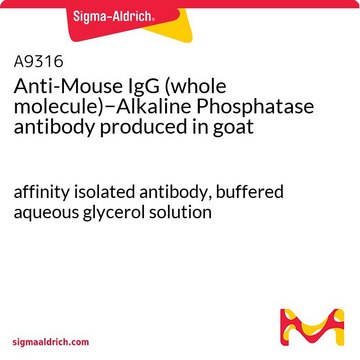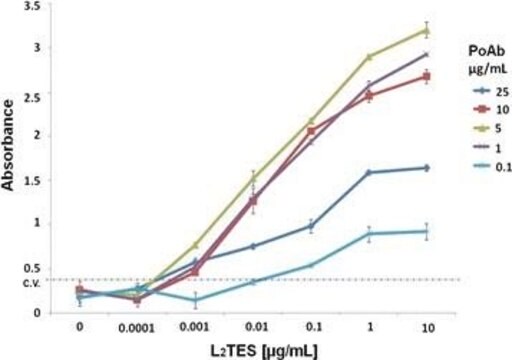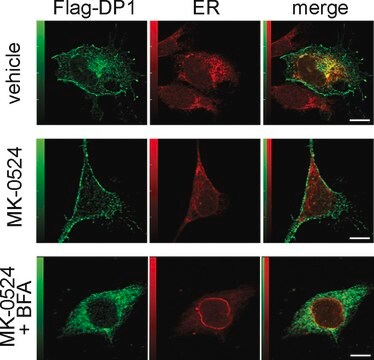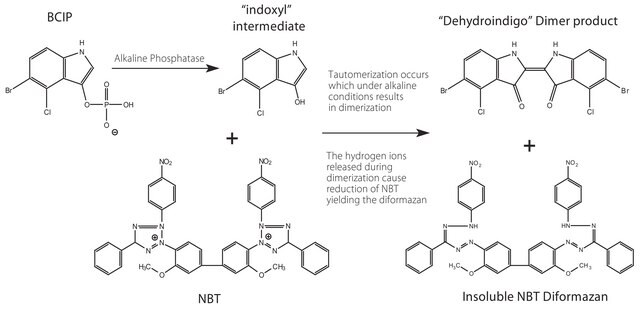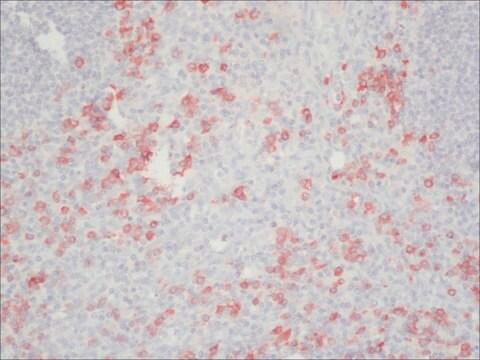A5153
Anti-Mouse IgG (whole molecule)−Alkaline Phosphatase antibody produced in goat
affinity isolated antibody, buffered aqueous solution
Sign Into View Organizational & Contract Pricing
All Photos(1)
About This Item
Recommended Products
biological source
goat
Quality Level
conjugate
alkaline phosphatase conjugate
antibody form
affinity isolated antibody
antibody product type
secondary antibodies
clone
polyclonal
form
buffered aqueous solution
technique(s)
direct ELISA: 1:7,000-1:21,000
shipped in
wet ice
storage temp.
2-8°C
target post-translational modification
unmodified
Looking for similar products? Visit Product Comparison Guide
Related Categories
General description
Affinity isolated antigen specific antibody is obtained from goat anti-mouse IgG antiserum by immunospecific purification which removes essentially all goat serum proteins, including immunoglobulins, that do not specifically bind to mouse IgG. Goat anti-Mouse IgG is conjugated to Sigma Alkaline Phosphatase, Type VII-S (Product No. P 5521) by protein crosslinking with 0.2% glutaraldehyde. Anti-Mouse IgG (Whole Molecule) is determined to be immunospecific for mouse IgG by immunoelectrophoresis (IEP), versus mouse IgG and normal mouse serum, prior to conjugation. Prior to conjugation, the antibody is found to be reactive with mouse IgG1, IgG2a, IgG2b, and IgG by Ouchterlony Double Diffusion (ODD). Identity and purity of the antibody is established by immunoelectrophoresis (IEP), prior to conjugation. Electrophoresis of the antibody preparation followed by diffusion versus anti-goat IgG and anti-goat whole serum result in single arcs of precipitation.
Specificity
Binds all mouse Igs.
mouse IgG1, IgG2a, IgG2b, and IgG
Immunogen
Purified mouse IgG
Application
Applications in which this antibody has been used successfully, and the associated peer-reviewed papers, are given below.
Western Blotting (1 paper)
Western Blotting (1 paper)
Surfactant Protein A was detected in bronchoalveolar fluid using alkaline phosphatase conjugated goat anti-mouse IgG as the secondary at μg/ml in TBS/Tween containing final concentration of 0.5M NaCl.
Western blot analysis of nuclear or mitochondrial protein extracts were performed using alkaline phosphatase conjugated goat anti-mouse IgG as the secondary antibody at a 1:5000 dilution in 5%BSA/TBS for 1 hour at room temperature. 5-bromo-4-chloro-3-indolyl phosphate/nitroblue tetrazolium (Sigma) was used for the substrate.
Physical form
Solution in 0.05 M Tris, pH 8.0, containing 1% bovine serum albumin, 1 mM MgCl2 and 15 mM sodium azide.
Disclaimer
Unless otherwise stated in our catalog or other company documentation accompanying the product(s), our products are intended for research use only and are not to be used for any other purpose, which includes but is not limited to, unauthorized commercial uses, in vitro diagnostic uses, ex vivo or in vivo therapeutic uses or any type of consumption or application to humans or animals.
Not finding the right product?
Try our Product Selector Tool.
Storage Class Code
10 - Combustible liquids
WGK
WGK 2
Choose from one of the most recent versions:
Already Own This Product?
Find documentation for the products that you have recently purchased in the Document Library.
Xian Fu et al.
mBio, 8(5) (2017-09-07)
Methionine sulfoxide reductase A (MsrA) is an antioxidant enzyme found in all domains of life that catalyzes the reduction of methionine-
Siti Aisyah Abdul Ahmad et al.
Virology journal, 14(1), 229-229 (2017-11-23)
The rapid rise and spread in dengue cases, together with the unavailability of safe vaccines and effective antiviral drugs, warrant the need to discover and develop novel anti-dengue treatments. In this study the antiviral activity of geraniin, extracted from the
Dhaval K Shah et al.
International journal of pharmaceutics, 465(1-2), 228-238 (2014-02-11)
To facilitate the development of an inverse targeting strategy, where anti-topotecan antibodies are administered to prevent systemic toxicity following intraperitoneal topotecan, a pharmacokinetic/toxicodynamic (PK/TD) model was developed and evaluated. The pharmacokinetics of 8C2, a monoclonal anti-topotecan antibody, were assessed following
Lana J McMillan et al.
Applied and environmental microbiology, 82(2), 538-548 (2015-11-08)
Soluble inorganic pyrophosphatases (PPAs) that hydrolyze inorganic pyrophosphate (PPi) to orthophosphate (Pi) are commonly used to accelerate and detect biosynthetic reactions that generate PPi as a by-product. Current PPAs are inactivated by high salt concentrations and organic solvents, which limits
Tonia Zangari et al.
mBio, 8(2) (2017-03-16)
Epidemiological studies on Streptococcus pneumoniae show that rates of carriage are highest in early childhood and that the major benefit of the pneumococcal conjugate vaccine (PCV) is a reduction in the incidence of nasopharyngeal colonization through decreased transmission within a
Our team of scientists has experience in all areas of research including Life Science, Material Science, Chemical Synthesis, Chromatography, Analytical and many others.
Contact Technical Service